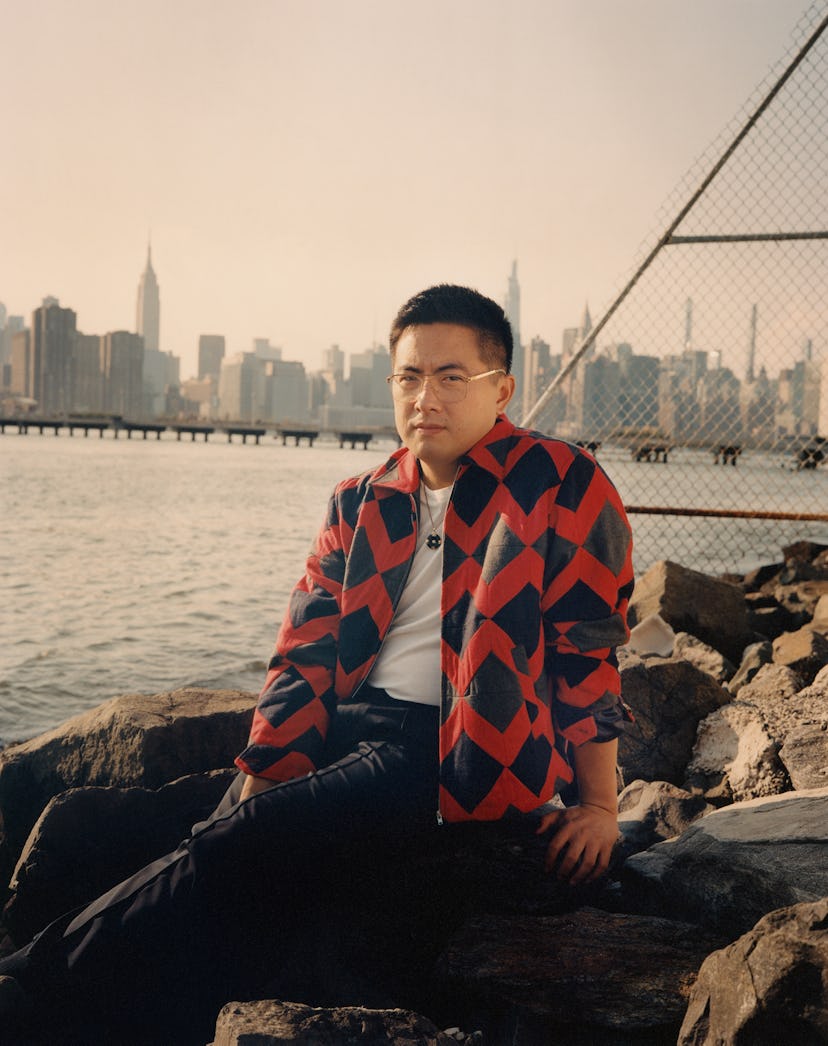Bowen Yang Isn’t Here to Check a Box for Representation

For our annual “The Originals” issue, we asked creatives—pioneers in the fields of art, design, fashion, comedy, activism, and more—to share their insights on staying true to themselves. Read all of this year’s interviews here.
In the past three years, you went from doing stand-up in New York City to writing for Saturday Night Live, then joining the show’s cast, then becoming the first Chinese-American actor to receive an Emmy nomination for Outstanding Supporting Actor in a Comedy Series. Your podcast, Las Culturistas, is wildly popular, and you have appeared in Awkwafina Is Nora From Queens and Broad City. It’s safe to say you’ve done plenty of interviews at this point. What is the most unoriginal thing people ask you?
Do I feel pressure for whatever representation framing they want to throw on me. There’s no good answer for that. So I think that makes it a bad question already, but then the fact that it’s asked so much also makes it unoriginal. I understand why it’s an important thing to talk about. I just don’t know that I’ve ever felt good about answering it.
What do you tell them?
It sounds like such a canned answer, but I tell them I can’t speak for everyone. And lately I’ll just be like, It’s not fully honest of me to say that I do, and it’s not fully honest of me to say that I don’t. So I’m somewhere in the middle, and it changes day to day. If the journalists are asking how I’m feeling, if they want an emotional response, then it just depends on my emotional state when they ask me.
What’s the most original thing about you?
I’m open to and like lots of different kinds of things. And I know that’s very broad, but I generally like things as opposed to disliking them. A lot of times I wish I was more critical, but I think I’ve just accepted the fact that I’m going to like something until I don’t, for whatever reason. That’s going to be the order, and I think that’s okay for me.
What was your style like as a teenager?
Really misguided—and not even in an interesting way. The thing that comes to mind is this T-shirt that I bought from Hollister that said “Horn if You’re Honky.” Anytime I would wear it to school, I would feel so powerful. And then white people would raise an eyebrow at me. It was maybe my first instance of someone accusing me of being reverse racist. And I was like, Oh god, is that real? Coming of age in suburban Colorado was like being in geographical purgatory: There’s no directionality to where people move on after high school, so a lot of people lead perfectly great lives just staying there. Growing up, I was getting a jumble of signals and did not think of myself as someone who could express myself through my clothes other than to be ironic and silly.
Whom do you consider original?
John Waters. He was able to create a space for people who did not have one in the world of film to come in, and they just became these enduring personalities. When you watch his films, obviously they’re meant to be shocking and disgusting and awful to watch. And that intention, that awe, is intact, even though a lot of it is decades old. That feels original.
Where in the world, and doing what activity, are you happiest?
I’m with a bunch of friends, and we’re all playing a really good game of Quiplash or something at a vacation house. Someone else has volunteered to cook, and we’re all very patiently working on a puzzle, and there’s a Sade album playing in the background.
Bode jacket; Sunspel T-shirt; Berluti pants; his own glasses and jewelry.
Grooming by Melissa DeZarate using René Furterer hair care.
So you’re a puzzle person?
Not really, but for some reason, the image makes me happy.
Because, you know, there are two camps: people who love puzzles and people who hate them.
I think I’m the first person to be ambivalent. That is the really original thing about me—the one prevailing thing.